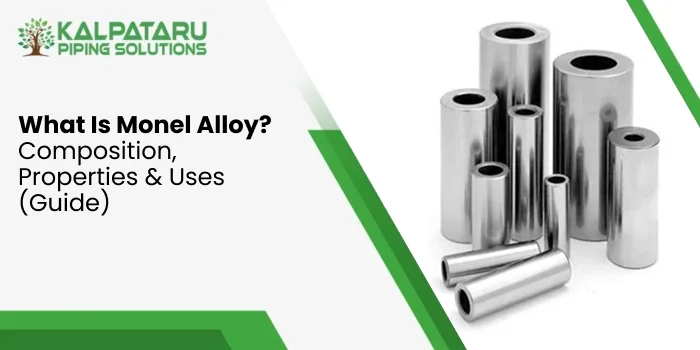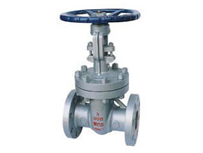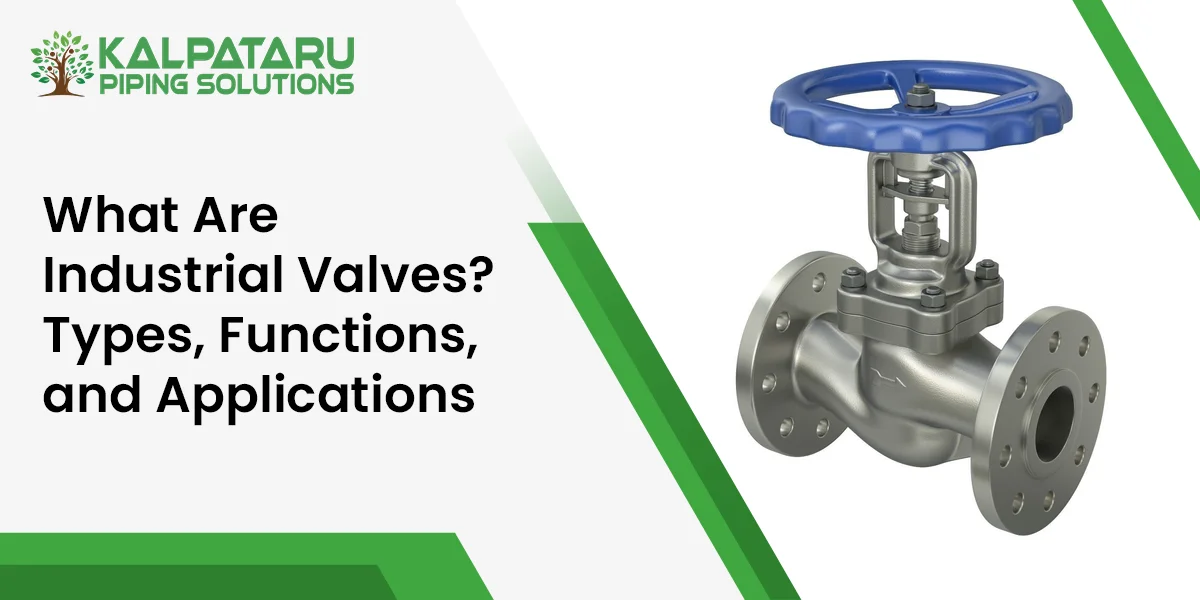
Enquire Now
What Is Monel Alloy? Understanding the Basics
Monel refers to the category of nickel-based alloys where copper serves as the main alloying component. Alongside nickel and copper, these alloys may contain trace amounts of elements such as iron, manganese, carbon, silicon, sulfur, aluminum and titanium with the precise composition tailored to meet specific performance requirements.
Known for their exceptional strength and resistance to corrosion in both freshwater and marine environments, Monel alloys also maintain stability across a wide temperature range. These characteristics make them ideal for demanding and harsh applications.
How Monel Alloy Is Made?
Monel material is a precipitation-hardened alloy created by combining nickel, copper, and additional metals. Its typical composition ranges around 65–70% nickel, about 20% copper, with smaller amounts of iron and manganese, varying according to the specific grade and intended application. Overall, this alloy is highly valued for its remarkable resistance to external corrosive and environmental factors.
Monel Alloy Composition: What Makes It Unique
The monel metal composition varies depending on the grade, with each element contributing specific properties that enhance performance. The table below highlights the key elements, their typical content ranges, functional effects, and representative Monel alloys.
|
Composition |
Content Range |
Effect |
Typical Alloy |
|
Nickel |
40% ~ 70% |
Stabilizes the Austenitic Structure |
Monel 400 |
|
Copper |
22% ~ 56% |
Corrosion Resistance, Electrical Conductivity |
Monel 401 |
|
Aluminum |
0% ~ 3.5% |
Provides Strength |
Monel K-500 |
|
Titanium |
0% ~ 0.85% |
Provides Strength |
Monel K-500 |
Physical Properties of Monel Alloy
Monel alloys combine high strength and good thermal and electrical conductivity. They also have a low thermal expansion, making them stable in extreme environments and ideal for marine and industrial applications.
| Physical Properties | Monel 400 | Monel R-405 | Monel K- 500 |
|---|---|---|---|
| Density (g/cm3) | 8.8 | 8.8 | 8.44 |
| Curie Temperature | 21 – 49 | 28 – 34 | – |
| Electrical Resistivity @ 100 C (Annealed) (µΩ.m) | 0.537 | 0.537 | 0.618 |
| Thermal Linear Expansion @ 100 C (Annealed) (µm/m.°C) | 14.2 | 14.2 | 13.7 |
| Thermal Conductivity @ 100 C (Annealed) (W/m.°C) | 24 | 24 | 19.4 |
| Specific Heat @ 100 C (Annealed) (J/kg.°C) | 445 | 445 | 448 |
Mechanical Properties of Monel Alloy
Understanding the mechanical properties helps engineers and designers ensure safety, efficiency, and longevity in critical operations.| Mechanical Properties | Monel 400 | Monel R-405 | Monel K-500 |
|---|---|---|---|
| Hardening Method | Cold drawn & stress relieved | As cold drawn | Hot finished & aged |
| Tensile Strength (MPa) | 579 to 827 | 586 to 793 | 695 to 1310 |
| Yield Strength (0.2 % Offset) (MPa) | 379 to 690 | 345 to 724 | 690 to 1034 |
| Elongation (%) | 22 to 40 | 15 to 35 | 20 to 30 |
| Hardness (Rockwell) | 20 to 85 B | 23 to 85 B | 27 to 38 C |
Chemical Properties of Monel Alloy
It is necessary to know the chemical properties to ensure long-term stability, resisting corrosion, oxidation, and chemical attack.| Element | Monel 400 | Monel R-405 | Monel K-500 |
|---|---|---|---|
| Nickel (wt %) | 63 min. | 63 min. | 63 min. |
| Copper (wt %) | 28 – 34 | 28 – 34 | 27 – 33 |
| Manganese (wt %t) | 2 max. | 2 max. | 1.5 max. |
| Iron (wt %) | 2.5 max. | 2.5 max. | 2 max. |
| Sulfur (wt %) | 0.024 max. | 0.025 to 0.060 | 0.01 max. |
| Silicon (wt %) | 0.5 max. | 0.5 max. | 0.5 max. |
| Aluminum (wt %) | 0 | 0 | 2.3 to 3.15 |
| Titanium (wt %) | 0 | 0 | 0.35 to 0.85 |
Common Applications of Monel Alloy
Monel alloy is valued across multiple industries for its strength, durability, and exceptional resistance to corrosion and heat. Its wide range of applications extends from heavy engineering to everyday consumer products.
- Marine Engineering: Thanks to its exceptional resistance to seawater corrosion, Monel is a preferred material for marine use. It is commonly utilized in components such as pipes, pump shafts, strainers, anchor chains, water and fuel tanks, propellers, valves, fasteners, and even specialized fishing lines.
- Aerospace Industry: Monel alloys play an important role in aerospace because of their ability to endure extreme temperatures. They are employed in aircraft coatings, aeronautical assemblies, space equipment, and as locking wire in high-heat environments.
- Petroleum Sector: In oil and gas operations, Monel is frequently used for crude distillation towers, extraction well equipment, and valves. Its ability to handle hydrofluoric acid, sulfides, slurries, and elevated temperatures makes it highly valuable in this sector.
- Musical Instruments: Monel is also chosen for premium musical instruments and accessories. It is used in electric guitar and violin strings, as well as in rotor and piston valves for brass and wind instruments, ensuring durability and consistent performance.
- Chemical Processing: The chemical industry relies on Monel for equipment and instruments that must withstand corrosive substances without degrading, making it ideal for demanding chemical environments.
- Everyday Products: Beyond heavy industries, Monel is found in daily-use items such as eyeglass frames, heating system parts, water tanks, boilers, and kitchen sinks, showcasing its versatility and reliability.
Advantages of Monel Alloy
Monel alloy is chosen for its exceptional combination of strength, durability, and resistance to extreme conditions. These advantages make it a preferred material for demanding industrial, marine, and high-performance applications.
- Exceptional Corrosion Resistance: Monel exhibits outstanding resistance to corrosion in harsh environments, including seawater, acids, and alkalis. This makes it a reliable choice for applications exposed to aggressive chemicals and marine conditions.
- High-Temperature Stability: The alloy retains its mechanical strength even at elevated temperatures, ensuring consistent performance. This property makes it suitable for use in heat-intensive industrial processes and aerospace applications.
- Superior Mechanical Strength: Monel is known for its hardness and toughness, providing excellent structural integrity. It can withstand heavy loads and mechanical stress without deformation, making it ideal for demanding applications.
- Non-Magnetic Properties: Being non-magnetic, Monel is ideal for use in equipment or instruments where magnetic interference must be avoided. This makes it a preferred material in scientific, medical, and electronic applications.
- Ease of Machining: Compared to other nickel-based alloys, Monel is easier to machine, reducing manufacturing time and costs. It can be shaped and fabricated into precise components without excessive tool wear.
- Fire and Heat Resistance: Monel maintains its shape and composition under extreme heat, offering reliable performance in fire-prone environments. It ensures safety and durability even under prolonged exposure to high temperatures.
- Excellent Fatigue Resistance: The alloy can withstand repeated cycles of loading and unloading without cracking or failure. This makes it suitable for components subjected to constant stress or vibration.
- High Crack Resistance: Monel resists stress-induced cracking caused by corrosive substances such as chlorides. This property ensures longer service life in applications where other metals might quickly fail.
Limitations or Considerations of Monel Alloy
While Monel offers excellent strength and corrosion resistance, it also comes with certain limitations. Understanding these drawbacks helps in selecting the right material for specific applications.
- Higher Density: Monel is heavier than many alternative materials, which can be a concern in applications where weight reduction is critical.
- Welding Challenges: The high nickel content can make welding difficult, as the material is prone to cracking during the process.
- Higher Cost: Compared to materials like stainless steel or aluminum, Monel is more expensive, which may limit its use in budget-sensitive projects.
- Machining Difficulty: Its strength and toughness can make machining challenging, causing increased tool wear and complicating the achievement of precise tolerances.
Conclusion: Is Monel Alloy Right for Your Project?
Choosing the right material can prevent costly failures and ensure long-term performance. Monel Alloy delivers unmatched strength, corrosion resistance, and reliability, making it the ideal choice for projects in marine, aerospace, chemical and oil & gas industries. Partner with Kalaptaru Piping Solutions for premium monel pipe fittings, monel tube fittings, monel tubes and many more. Contact us today to secure the right Monel alloy for your project and guarantee superior performance and durability.
Frequently Asked Questions About Monel Alloy
Monel alloy is widely used in marine engineering, chemical processing, aerospace, oil & gas, and high-performance industrial applications due to its excellent corrosion resistance, strength, and durability. It is also used in everyday items like musical instruments, eyeglass frames, and valves.
Monel outperforms stainless steel in corrosion resistance, especially in seawater and acidic environments. It also maintains strength at high temperatures, though it is more expensive and heavier than stainless steel.
Monel is often referred to as a nickel-copper alloy, with popular grades including Monel 400 and Monel K-500.
Monel can be identified by its non-magnetic properties, high corrosion resistance, and characteristic silvery-white appearance. Specialized tests like spark testing or chemical analysis can confirm its composition.
Yes, Monel is highly resistant to rust and corrosion, even in seawater or acidic environments, making it ideal for marine and chemical applications.
Monel’s higher cost is due to its high nickel content, superior corrosion resistance and specialized manufacturing requirements, which make it more durable and reliable than many other metals.


